There was an article just published in the blog War is Boring by Andrew Bacevich called “American Generals Have Forgotten How to Win Wars”: american-generals-have-forgotten-how-to-win-wars
It is a long article with three completely different sections. The first section is that somehow or the other, all we have in Iraq and Afghanistan is generals who don’t know how to win. Really? Was that the problem in Korea when General MacArthur was in command and got driven out back from the Yalu and out of North Korea by the Chinese People’s Liberation Army (PLA)? His replacement was Matthew Ridgeway, who in World War II was commander of the XVIII Airborne Corps. He did not win in Korea either. Same for the next commander in Korea: Mark Wayne Clark.
Was that the problem with Vietnam, where a succession of generals, Harkins, Westmoreland, Abrams and finally Weyand, commanded? Was Abrams, who relieved Bastogne in World War II and had a tank named after him, one of these generals that did not know how to win? We did win the Gulf War in 1991, we were able to conquer Afghanistan in 2002 with few forces, and we were able to conquer Iraq in 2003. So, since World War II, we have been able to win under the right situation. I don’t think the issue is a “winning” versus a “non-winning” general. Bacevich gives a listing of the 17 commanders in Iraq and Afghanistan since they started. Of the 17 commanders listed, not a single one is a “winning general”? What are the odds of that being the case?
The second part of the article, starting with “Draining which swamp?”, actually makes a lot more sense and it would have been a better article without the first part. It is the nature of the war that is the problem. Napoleon, probably the winning-est general in history (over 60 battles fought), could never figure out how to solve the Spanish ulcer. That ulcer generated a new word: guerilla. It is the nature of guerilla wars and insurgencies that they generate a lack of clear wins.
The British seem to have a reputation as being counterinsurgency experts. They won in Malaya and Kenya in the 1950s. Yet, when it came to Northern Ireland, the conflict went on for over 30 years and was resolved by a settlement that included the political arm of the provisional IRA as a legitimate political party. Would we consider an arrangement in Afghanistan that included the Taliban as part of the government as a victory? Would we consider including ISIL or Al-Qaeda in a future Iraqi or Syrian government? It is kind of the same thing.
Anyhow, a clear win is sometimes elusive in guerilla wars, even for the British. Not only did they fight for over 30 years in Northern Ireland, but their victory in Malaya included giving the country independence. Seven years after they defeated the Mau Mau in Kenya, they also gave that country independence. Their results in Palestine in the late 1940s, Cyprus in the 1950s and Aden in the 1960s were even less successful. In the case of Cyprus, the guerilla force leader also became the head of a Cypriot political party. So, the British appear to have a winning problem also.
In our original work on insurgencies, part of what the Center for Army Analysis (CAA) wanted us to do was analyze different tactics and approaches and see what worked and what did not. This become difficult to do analytically, for eventually in almost every single extended guerilla war, most of the counterinsurgents ended up developing over the course of years of fighting many of the same answers, whether they were British, American, French, Portuguese, Soviets, Rhodesians, etc. We could not connect the tactics to the outcomes. The end result we ended up looking at the bigger issue questions, like grand strategies and size of forces involved. This was where we could get an analytical result (marketing alert: See my book America Modern Wars: Understanding Iraq, Afghanistan and Vietnam).
Bacevich picks up some of these questions in the second part of his article, where he states “The truth is that some wars aren’t winnable and no one should fight them in the first place.” He then concludes “In sum, a Trump administration seems unlikely to reexamine the conviction that the problems roiling the Greater Middle East will someday, somehow yield to a U.S.-imposed military solution.”
Not sure I agree with that conclusion, but I would strongly argue that understanding and defeating an insurgency is much more complicated than just changing a general. We have certainly changed enough generals in Iraq and Afghanistan that by happenstance one should have won, if it was possible. Some argue that Patreaus did win in Iraq (but he clearly did not in Afghanistan). Did Patreaus forget how to win when he went from one war to the next?
Anyhow, to win these wars requires a combination of proper professional approaches, proper resources, and proper engagement times. Our continued attempts to win these wars on the cheap, or shorten the commitment to them, or to find some magic trick (like a surge) that will win it…..have not really worked out. It is time to get serious.


